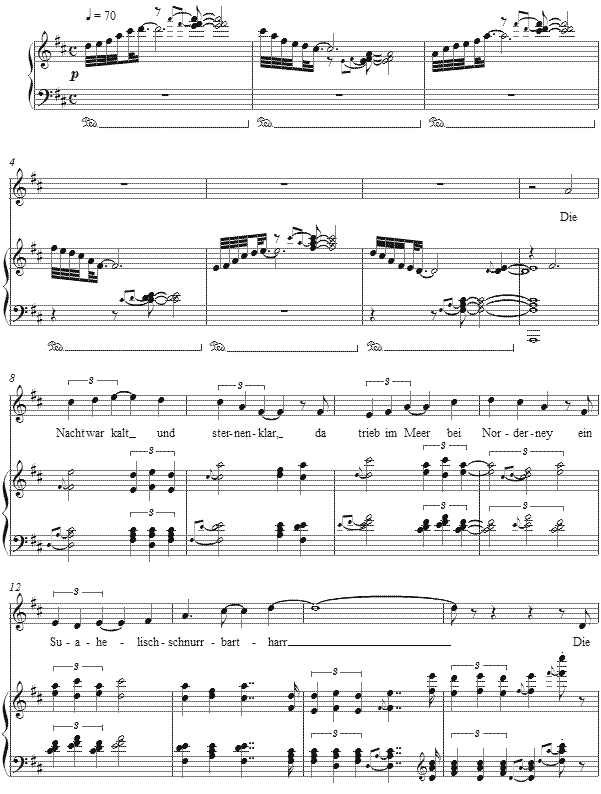Music and Texts of GARY BACHLUND
Vocal Music | Piano | Organ | Chamber Music | Orchestral | Articles and Commentary | Poems and Stories | Miscellany | FAQs
Logik - (2009)
Joachim Ringelnatz
for medium voice and piano
Die Nacht war kalt und sternenklar,
Da trieb im Meer bei Norderney
Ein Suahelischnurrbarthaar. -
Die nächste Schiffsuhr wies auf drei.
Mir scheint da mancherlei nicht klar,
Man fragt doch, wenn man Logik hat,
Was sucht ein Suahelihaar
Denn nachts um drei am Kattegatt?[ 2 pages, circa 1' 40" ]
Joachim Ringelnatz
The night was cold and starlit,
In the sea near Norderney [ 1 ] drifted
A Swahili's moustache hair. -
The next ship's bells would be three.
Some things seem to me not clear,
And so one asks, when one is being logical,
How is it one seeks a Swahili's hair
About three bells on the Kattegat? [ 2 ]
gb
Taken from Ringelnatz' anthology of mariner related poetry and nonsense, Kuttel Daddeldu (1920), this little two stanza poem sets up a scene which would sound plausible until one realizes it is a soft poke at what philosophers since Jeremy Bentham have come to call "intentionality." That something should become the object of consciousness -- in this case a Swahili's moustache hair -- does not make the situation sensible in the context of a North Sea adventure. Rather, like surrealism, it points out that man's consciousness is often easily subverted. One need only an object for the mind, and "off we go to the races." Ringelnatz halts this race in the second stanza, reminding us to apply logic to that which we might read or hear.
As Ringelnatz creates a possibly plausible scene in the first stanza, we come to realize that even the mention of "three bells" is precious little information because this nautical time cannot be recognized without additional references, it being possibly 2130 in the early night, 0130 or 0530 in the "wee hours."
This urge towards rationality alongside individuality would bring him into conflict with the early advent of National Socialism and its emphasis on deceitful rhetoric and the enforced collective. Against that urge to the state collective, Ringelnatz created his sailor, Kuddel Daddeldu, whose drunken antics and disdain for authority gained favor with the public, until his work was officially branded as "degenerate" by the Nazis in 1930.
The notion of logic is portrayed by a row, in this case wholly consonant and major-ish, as I had often done in my schooling to annoy those modern composers who believed so wholly in the twelve-tone system and especially in significant dissonance for its own sake that, by simply pushing back at this orthodoxy of the twentieth-century, I found myself a dodecophonoclast. [ 3 ] The tonal fabric of the setting is of this material appearing throughout in various inversions. Some of the interior forms are palindromic as expressions of an enforced logic.
The score is available as a free PDF download, though any major commercial performance or recording of the work is prohibited without prior arrangement with the composer. Click on the graphic below for this piano-vocal score.
NOTES
[ 1 ] Norderney is one of the seven East Frisian Islands off the North Sea coast of Germany, as well as a place name for a municipality in the district of Aurich in Lower Saxony. In Ostfriesisches Plattdeutsch, it is called the Nördernee. Ringelnatz's choice of the place name is apt, for we can be logically uncertain as to an exact location, but rather only know "about."
[ 2 ] The Kattegat or Kattegatt as known in Swedish is a sea area bounded by Jutland, Scania, Halland and Bohuslän. The Baltic Sea leads into the Kattegat through the Oresund and the Danish Straits. The Kattegat is viewed as a bay of the Baltic Sea, a bay of the North Sea, or, in traditional Scandinavian usage, neither of these. One's national perspective alters the perception of this place, whereas water flows to water and logically it may all simply be called the North Sea near to Denmark, Sweden or Germany.
[ 3 ] A recently minted word by Elaine Fine: "dodecophonoclast." For more information, please see my setting: dodecophonoclast.

